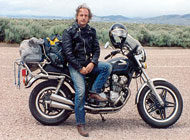Lane Filtering To Now Be Legal In Colorado

Colorado’s streets and roads may take on a more European flavor starting August 7, when lane-filtering will become legal. This photo is from Rome.
Gov. Jared Polis signed Senate Bill 24-079 on April 4 and motorcycle lane filtering will now be legal in Colorado starting on August 7. Mind you, that doesn’t mean you can just go crazy with it the way I’ve seen many people do in cities in Europe. There are rules about what you can do and under what circumstances. Let’s go through the law.
As written, the bill first went through several examples of how filtering has been found safe and reasonable in other places. For instance:
A 2009 “Motorcycle Accidents In Depth Study” by the European Association of Motorcycle Manufacturers that was conducted in five European countries found that 0.45 percent of motorcycle crashes involved lane splitting and that motorcyclists were seven times more likely to be hit while stopped compared to crashing while lane splitting
This list ended saying:
Lane filtering is prohibited in Colorado and can result in various citations, including violations of motorcycle lane restrictions and careless driving laws. Therefore, the general assembly determines that the act of lane filtering by a driver of a motorcycle, when done at speeds at or below 15 miles per hour and when conditions permit, is in the best interests of motorist safety.
Aye, there’s the rub–below 15 miles per hour and when conditions permit. Here’s what the law says. I’ll clean up the sections and legalese a bit to make it read more smoothly.
The driver of a two-wheeled motorcycle may overtake or pass another motor vehicle in the same lane as the motorcycle if the overtaken or passed motor vehicle is stopped and if the motor vehicles in the adjacent lanes traveling in the same direction are stopped and the motorcycle is on a road with lanes wide enough to pass safely and if the passing motorcycle is driving at fifteen miles per hour or less and conditions permit prudent operation of the motorcycle while overtaking or passing.
OK, so traffic has to be stopped, you have to have room to pass safely, and you can’t be going more than 15 miles an hour. But there’s more. When traffic starts moving again you have got to get back in your lane and start moving with traffic again. Then:
A person overtaking or passing pursuant to this subsection shall not overtake or pass on the right shoulder or to the right of a vehicle in the farthest right-hand lane if the highway is not limited access or in a lane of traffic moving in the opposite direction.
OK this is the part that I’m not clear on. You can’t pass on the shoulder or to the right of the right-most lane of traffic. But: “if the highway is not limited access.” So does this mean that on a limited access highway, such as an interstate, you can legally pass on the shoulder? That sure seems to be what it says. So you are limited on city streets or most highways but not on the really big roads. Is that correct?
As for the city streets situation, it was my impression during the hearings that some of the legislators were thinking this behavior would not be allowed on city streets but I see nothing in the bill that rules that out. And let’s get real, it’s exactly that filtering that is so commonplace in other places. Heck, in California one time I did that myself at a traffic light on a city street along with a bunch of other riders. The lady in the front car was familiar enough with the practice that she stopped back from the intersection enough to provide room for us to pull in in front of her.
Another thing I’ll be watching for is that to my knowledge, this law does not apply to scooters. By that I mean those 50cc and smaller two-wheelers that are not counted as motorcycles. This was an issue brought up in the hearings. Small scooters like that are not allowed on big highways anyway but they are certainly allowed on city streets. And if you start seeing motorcycles filtering on city streets I’m betting the scooter folks will start doing it, too. Could get interesting.
Now, as is customary with something like this, the legalization of the practice is for now temporary. In four years the law will be nullified unless the legislature extends it. To that end, the Colorado Department of Transportation is mandated to keep records and produce a study of the effects and present that study to the legislature by January 1, 2027.
So happy riding out there. But remember, don’t do any filtering before August 7. Then for pete’s sake, do it safely. We don’t want the law repealed in four years.
Biker Quote for Today
You might be a Yuppie biker if you refer to your bike as your “toy.”
